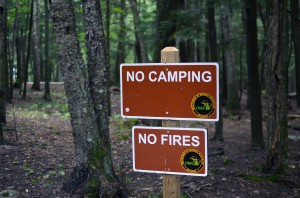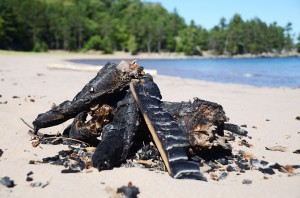For students who enjoy being outside, the allure of setting up a tent on the shore of Lake Superior is easy to give in to. In fact, it seems some of the most popular places to hike, hangout and set up the occasional campsite are on the beaches of Lake Superior.

However, most of the campsites found on these beaches are in fact illegal to overnight camp on, according to Tim Melko, the administrative manager for the regional chapter of the Michigan Department of Natural Resources (DNR).
“Technically there is no camping on public land on Lake Superior in Marquette County,” he said. “The reason we don’t want camping on that side of the highway is to maintain the integrity of that beach area.”
Melko said, in general, the east (Lake Superior) side of Country Road 550, or Big Bay Road, is under a land-use order that does not allow for any camping or ground fires on the beaches north of Marquette. This includes, according to Melko, recreational areas like Wetmore Beach, Little Presque Isle and Hidden Beach. However, any state land on the west, or inland, side of 550 is legal to camp on, and Melko encouraged students and community members alike to take advantage of this land.
“We encourage people who want to go camping to go,” he said. “There is a lot of public land in Marquette County.
“Everyone wants to kind of camp on Lake Superior because it’s the big lake, but we have tons of inland lakes and rivers and streams that have great campsites as well.”
Melko suggested a few specific locations of state land for camping, including the Little Garlic River area.
“Actually, in the Little Garlic area we have hundreds of acres back there with a nice little river going through it, which is great for fishing,” he said. “There is good deer and grouse hunting up there as well and it’s only a 20-minute drive (from Marquette) so not very far at all.”
Other popular hiking areas in that area, including Harlow Lake, Hogback and Sugarloaf, have varied camping restrictions. Harlow Lake is owned by the state, and Melko asks only that campers set up at least one mile from the six Harlow Lake cabins. Hogback is owned by the state and is legal to camp on and near, while Sugarloaf is actually a day-use only area, and is owned by Marquette County and not by the state.
“The only (Marquette) County property that’s (in that area) is our Sugarloaf property,” said Marquette County Forest Senior Planner Alan Feldhauser. “All we own is Sugarloaf Mountain and there is no camping there — no camping, no fires.”
However, according to Feldhauser, Marquette County does own many tracts of land near Sawyer and Gwinn that do allow camping, and that Feldhauser encourages the use of.
“We’ve got 9,300 acres in the more central portion of Marquette County, around where the airport is near Sawyer,” he said. “It’s open to the public just as much as state land is.”
Both Feldhauser and Melko emphasized that campers need to retrieve a permit from the county or state in order to camp in designated forests. These permits are free and need only to be attached to a campsite when it’s being used, and taken away with campers when they leave. Melko said the permits, which can be found anytime outside the MDNR office on US-41 south of Marquette, have a list of rules on the back summarizing what campers need to do to maintain natural areas and respect those coming after them.
“Fires are legal to have, however it’s not legal to cut living trees,” he said. “So you’re allowed to collect dead and down trees for fires, we just ask that you use common sense. Keep fires small and make sure they are completely extinguished before you leave.
“We actually ask you to do a hand touch, if you put your hand on top of it and it’s still too warm for your hand, then you need to put more dirt or water on top.”

Melko listed a few other common sense rules as well, such as the “Leave No Trace” camping procedures and not using or breaking glass containers. Campers should also not make fires when the MDNR has listed fire danger as ‘high’ or ‘extremely high.’
“We just ask people to be respectful and respect others who are out there using the recreation opportunities,” Melko said.
In the past, many students have been caught camping at areas within the Wetmore Beach and Little Presque Isle land area. Hunter White, a senior human centered design major, said he was caught last fall at a beach south of Wetmore Beach, but was only issued a warning by a MDNR officer.
“We were camping out there with a group of roughly eight people with a small fire and slackline set up,” White said. “A DNR guy walked down from the path and was polite about letting us know that by law we weren’t allowed to have fires or camp where we were. He told us that if we went across (550) we’d have no problem.”
While White did not receive a ticket in this situation, Melko said in some cases, citations could be issued.
“Obviously if you’re at Little Presque Isle and you get caught camping there or have a ground fire there or alcohol and glass containers, you could be issued a citation or a ticket,” Melko said. “The process of us issuing tickets is that if we write a ticket for an infraction, we then turn them over to the Marquette County prosecutor and the Marquette County prosecutor is actually the one that proceeds with the charges.”
Melko recommends students stop by the MDNR office if they have any questions about camping, or to pick up a free camping permit. He also encourages the use of state land, especially with the coming of fall.
“The fall is a great time to get out and camp, the weather is still nice, there are no bugs and the cool air is good to sleep in at night,” he said.
According to the Marquette County Forest website, the definition of overnight camping is the use of a tent or tent-type camper; the use of a mobile camper; or simply sleeping in any type of motor vehicle, sleeping bag or in any other manner between 10 p.m. and 8 a.m. on lands not designated for camping.

For more information regarding camping in Marquette County, visit the MDNR office located at 1990 US-41 in South Marquette, or call
(906) -228-6561.
























